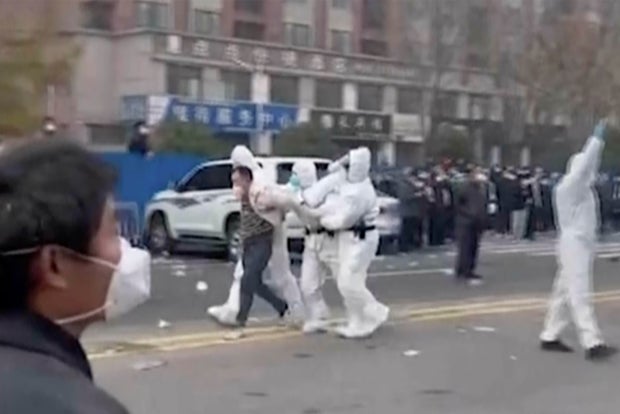Foxconn, the electronics manufacturing company that assembles Apple’s iPhones, apologized Thursday for the pay dispute that triggered massive employee protests, and violent police pushback, at a factory in central China where anti-virus controls slowed production.
Mounting unrest at the Zhengzhou factory has persisted for at least a month, since thousands of employees staged a walkout in October over what they said were unsafe working conditions linked to the spread of COVID-19. All of this comes as China grapples with a spike in virus infections, seen especially in highly populated cities.
Foxconn hired a slate of new employees following the exodus. Accusations that the company unlawfully altered its policies for incoming workers, who say they were hired with the promise of higher pay than they are actually receiving, led to protests at the factory.
Videos shared on social media earlier this week appeared to show one particularly large demonstration involving thousands of people in Zhengzhou, wearing masks and facing rows of police officers wearing protective suits and holding riot shields. Police kicked and hit a protester with clubs after the person grabbed hold of a metal pole that was being used to strike him. Witnesses also said that employees at the iPhone factory were beaten and detained amid the protests.
Associated Press
Foxconn, the biggest contract assembler of smartphones and other electronics for Apple and other global brands, addressed employees’ complaints about wage discrepancies in its Thursday apology. The company blamed a “technical error” in the process of adding new employees and said they would be paid what they were promised.
“We apologize for an input error in the computer system and guarantee that the actual pay is the same as agreed and the official recruitment posters,” said a company statement. It promised to “try its best to actively solve the concerns and reasonable demands of employees.”
Late Wednesday, Apple said it had people on the ground at Foxconn’s Zhengzhou facility.
“We are reviewing the situation and working closely with Foxconn to ensure their employees’ concerns are addressed,” the company based in Cupertino, California, said.
The dispute comes as the ruling Communist Party tries to contain a surge in coronavirus cases without shutting down factories, as it did in 2020 at the start of the pandemic. Its tactics include “closed-loop management,” or having employees live at their workplaces without outside contact.
Authorities promised last month to reduce economic disruption by cutting quarantine times and making other changes to China’s “zero-COVID” strategy, which aims to isolate every case. Despite that, the infection surge has prompted authorities to suspend access to neighborhoods and factories and to close office buildings, shops and restaurants in parts of many cities.
On Thursday, people in eight districts of Zhengzhou with a total of 6.6 million residents were told to stay home for five days. Daily mass testing was ordered for a “war of annihilation” against the virus.
Apple earlier warned iPhone 14 deliveries would be delayed after employees walked out of the Zhengzhou factory and access to the industrial zone around the facility was suspended following outbreaks.
To attract new workers, Foxconn offered $3,500 for two months of work, according to employees, or almost 50% more than news reports say its highest wages usually are.
Employees complained that after they arrived, they were told they had to work an additional two months at lower pay to received the higher wage, according to an employee, Li Sanshan.
Foxconn offered up to $1,400 to new hires who choose to leave, the finance news outlet Cailianshe reported, citing unidentified recruiting agents.
Foxconn’s statement Thursday said employees who leave will receive unspecified “care subsidies” but gave no details. It promised “comprehensive support” for those who stay.
The protests in Zhengzhou come amid public frustration over restrictions that have confined millions of people to their homes. Videos on social media show residents in some areas tearing down barricades set up to enforce neighborhood closures.
Foxconn, headquartered in New Taipei City, Taiwan, earlier denied what it said were comments online that employees with the virus lived in factory dormitories.
